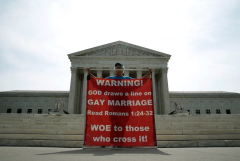
A new law in Mississippi that allows businesses to refuse to serve gay people has annoyed many states in the United States, with Washington and New York being the latest to issue travel bans to the Magnolia State.
However, the actions taken by the governors of those states are likewise being criticised for discriminating against Mississippi.
The governors of New York and Washington banned state employees from most work-related travel to Mississippi after the latter's Gov. Phil Bryant enacted into law H.B 1523, "Protecting Freedom of Conscience from Government Discrimination Act," which seeks to protect people from conscience from being forced to participate in LGBT issues, including same-sex ceremonies. The state of Vermont earlier issued a similar ban.
New York's Governor Andrew Cuomo on Tuesday issued an executive order banning non-essential state-funded travel to Mississippi. The other week, he also banned travel to North Carolina over its religious freedom bill.
Earlier, New York and Washington banned certain citizens from traveling to Mississippi in an effort to economically blackmail the state, LifeSite News reports.
Cuomo described the Mississippi law as "sad" and ''hateful."
"I will not allow any state employee travel to Mississippi until the law is repealed," he told ABC News.
Washington's Governor Jay Inslee and Seattle Mayor Ed Murray have also barred state and Seattle city employees from traveling to Mississippi on official business, a week after issuing an identical executive order against North Carolina, where Governor Pat McCrory signed that state's Religious Freedom Restoration Act into law.
"It is the law of Washington state and the policy of my administration to demand equality for all persons," Inslee said.
Meanwhile, big companies such as PayPal and Levi Strauss & Co. have likewise joined the protest against the anti-gay law. PayPal said it will not proceed with plans to set up global operations centres in Charlotte, North Carolina which promises 400 jobs
"We believe equality and non-discrimination fosters talent and innovation," Levi Strauss & Co. tweeted in response to the Mississippi law.
But Tim Wildmon, president of the American Family Association, told LifeSite News that the states' travel ban in reaction to Mississippi's new religious conscience law "is absurd."
"This action offends thousands of Mississippians that have supported this legislation all along," Wildmon said.
"In this situation, Mississippi is being discriminated against."
Tony Perkins, president of Family Research Council, also believes that leaders in Mississippi, North Carolina, and Texas have chosen "to defend the fundamental freedom of their citizens to believe and live according to those beliefs, rather than capitulate to the economic threats."
The new Mississippi law is reportedly explicitly anti-LGBT. It allegedly proclaims that transgender identities aren't valid, marriage is exclusively heterosexual, and extra-marital intercourse is objectionable.
It requires schools and private businesses to specify gender-specific men's and women's "restrooms, spas, baths, showers, dressing rooms, locker rooms, or other intimate facilities."
It says businesses may not be forced by government to service same-sex ceremonies imitating weddings.
The new legislation restrains government from forcing religious organisations to hire employees "whose conduct or religious beliefs are inconsistent with those of the religious organisation."
The state cannot also force religious adoption or foster care agencies to deviate from placing children with sexually complementary couples.
Under the new law, individuals may also follow their conscience and sincere religious belief that sex belongs within committed, natural marriage by not renting homes to cohabitating couples.
The Mississippi law takes effect in July.















